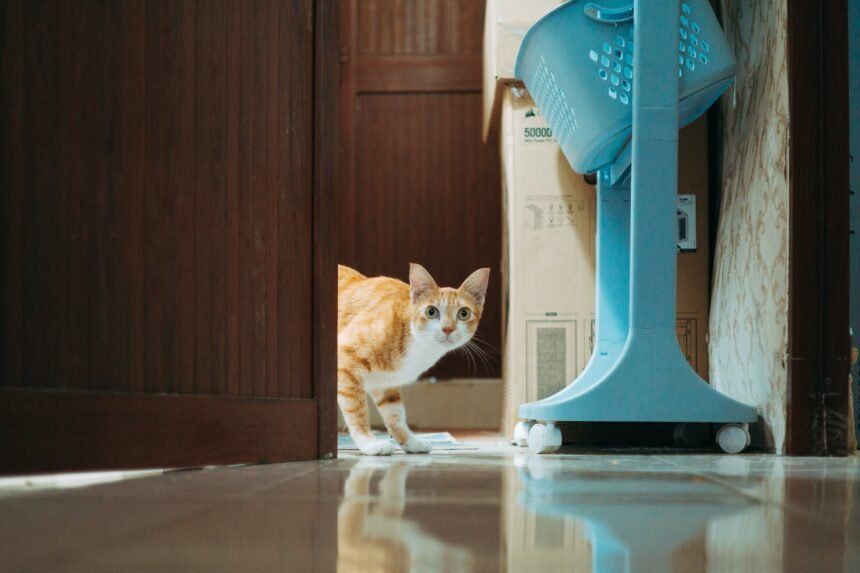The majority of cat owners have probably noticed a paw sticking out from under a closed bedroom or bathroom door. Is this an attempt to get attention, or is there another reason? We looked at this typical behavior of cats.
Recognizing the Behavior of Felines
Cats are inherently lively and inquisitive animals. Their antics, which range from shoving objects off shelves and end tables to cramming themselves into boxes that are obviously too tiny for them, amuse and irritate us in equal measure. When you walk by, they try to get you involved in their game by grabbing at your ankles.
Playtime is essential to a cat’s health and happiness. In addition to keeping their bodies in good shape, it calms them down and reduces their propensity for boredom, destructive activity, and excessive meowing.
Cats are naturally curious creatures. They must be aware of what is going on around them. According to Rover’s expert cat behaviorist, Dr. Mikel Delgado, that’s because of basic survival instincts.
Cats need to be aware of their surroundings at all times since they are both predators and prey in the wild. They employ inquiry and observation as survival strategies.
Cats are inquisitive creatures who never stop learning.
According to researcher and philanthropist Stephen Grand, Ph.D., “true curiosity is all about persistently meddling with the world.”
And the paws beneath the door might be a part of that interference.
With eyes that can see in the dark, ears that can detect thunder before you do, and a nose that has 40 times more smell receptors than a human’s, cats are made for adventure.
A cat may even use its whiskers to sense its environment. Their whiskers, which are about the same width as their body, aid in their ability to maneuver through confined areas and are used by them to detect vibrations and variations in air currents.
The Allure of Having Fun Behind Closed Doors
There are a few situations where cats will frequently stick their paws beneath doors.
Delgado stated, “One is that there is a human on the other side and the door is closed.”
Perhaps all your cat wants is to be near you and give you attention.
Cats’ innate desire to hunt is another reason they frequently act in this manner.
According to Delgado, “cats are naturally drawn to crevices and things that resemble mouse holes or areas where prey may hide.” “Cats are compelled by nature to use their paws to investigate these areas as thoroughly as possible.”
A part of their hunting instinct could be to stick a paw beneath a door to check what might be there.
On opposing sides of a door, two cats may engage in play activities such as hitting a toy back and forth or pawing at one another.
Introducing a new cat to a resident cat usually involves letting them see and smell each other through a closed door. In order to ensure that the cats not only smell each other but also enjoy their time together, this can be extended to feeding them on either side of the door.
Territories also apply to cats. Your new cat will explore every room in your house when you bring him home from the shelter, taking in his surroundings and making his kingdom his own. He can become agitated by a locked door since it limits his access to the entire area. That’s why he might meow at a locked door.
According to Delgado, a cat may occasionally be suffering from separation anxiety when they are apart from you.
Environmental Elements
One of the best places for your cat to play under the doors is the bathroom. This might be the case due to cats’ propensity to accompany their owners into the restroom.
Your cat is likely to paw under the door and cry to be let in if you regularly let them in the bathroom while you’re taking a shower or getting ready for the day and then all of a sudden the door closes and they are locked out.
Because they are creatures of habit, cats are aware that their people frequently use the restroom. It makes sense that they would also like to enter there. Additionally, pets will rapidly learn how to grab your attention if you support the activity by paying them attention.
The restroom also has a ton of entertaining “toys.” There are countless places to play and get into mischief, like the fuzzy bathmat, the shower curtain, and that errant tissue.
Not only that, but the bathroom smells really good. Cats’ sense of smell is remarkably strong—roughly 14 times stronger than ours. They utilize it to smell out their prey and identify oncoming predators. They release pheromones through smell glands on their cheeks, tail, paws, and hindquarters. The bathroom is a great place to bump into others and rub each other’s behinds.
Pawing may also occur at the bedroom door, particularly if your cat sleeps with you routinely and the door is suddenly closed.
Advice for cat owners
Cats are just following their instincts to explore their surroundings or to try to interact with their humans when they play beneath doors; they are not being mischievous.
Delgado suggests speaking with your veterinarian and, if required, obtaining a referral to a behavior expert if your cat is exhibiting symptoms of separation anxiety, such as excessive vocalization, litter box avoidance, or self-injurious behavior like overgrooming.
She points out that rather than focusing on what your cat does when they are with you, separation anxiety is diagnosed based on what your cat behaves when they are alone.
Your cat may become stressed if you have a lot of regulations about which rooms they can enter.
If so, she advises determining the reason for your cat’s confinement or room blockage before addressing it individually.
To lessen the chance that your cat would urinate on your bed, she suggested, for instance, addressing litter box avoidance with a professional if you don’t let them in your bedroom because you worry they might pee on it.
You can try a variety of behavioral and environmental changes if your cat is keeping you up at night.
“Instead of locking them out of your bedroom, include interactive play, exercise, and adjustments to their feeding schedule to help them sleep through the night,” suggests Delgado.
“Play With Your Cat!” is the title of her future book. Delgado provides tips on how to get cats to play as well as an explanation of why cat parents should play with their pets on a regular basis. She talks about troublesome cat behaviors as well.
In summary
Pawing beneath doors is a common playful action for many cats. If this becomes an issue, creating a cat-friendly atmosphere that fulfills their natural hunting impulses and curiosity is not too difficult. They can reroute their curiosity and release some steam with the aid of interactive toys and activities.









